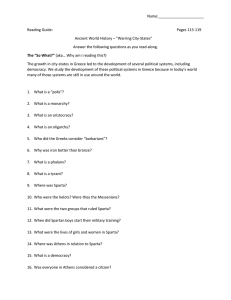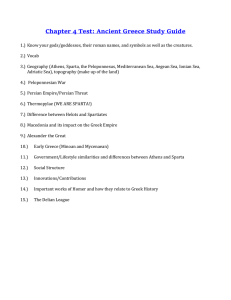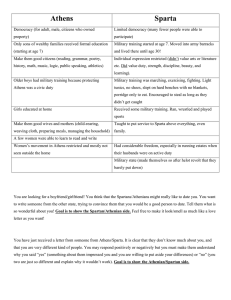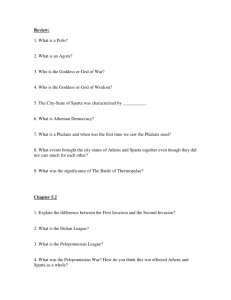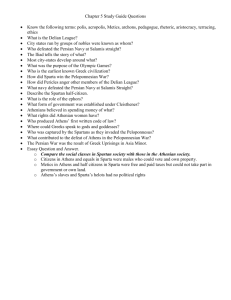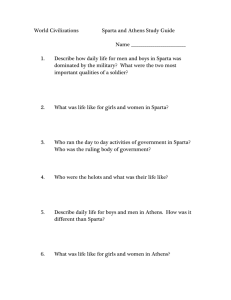Greek City States
advertisement
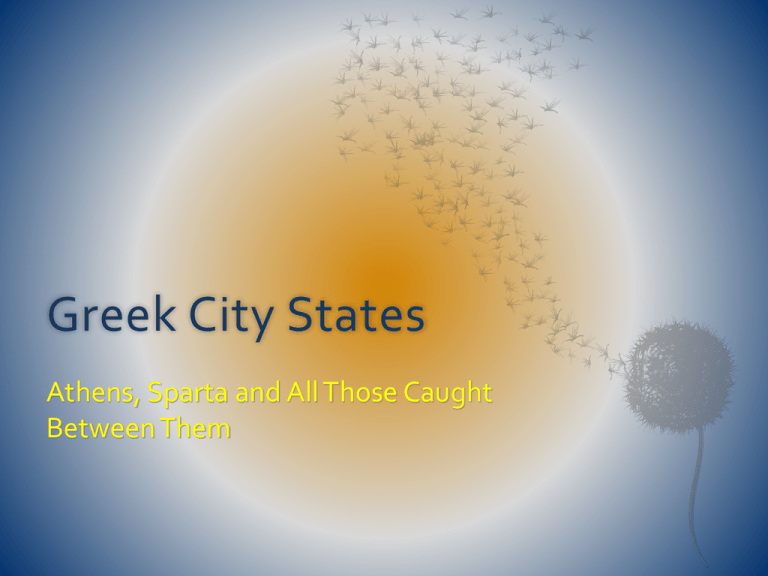
Greek City States Athens, Sparta and All Those Caught Between Them A Polis Mainland Ancient Greece eventually became controlled by several small city-states; called a polis in ancient Greek. These city-states were countries onto themselves. Each polis consisted of a single city protected by a wall and the surrounding countryside. These cities would often have a high acropolis (much like the Mycenaeans) within them and an agora (market place). Some of the Major City-States Delphi Athens Olympia Argos Corinth Sparta Free Men – Citizens and Metics City states had a group of people referred to as free men (this included their wives and children). In Athens free men fell into two groups called: citizens and metics A citizen was a free man, born to Athenian parents. Citizens were the most powerful and privileged group able to hold political office and serve in the army. Metics were men born outside of Athens. They came to Athens to trade or work. They paid taxes and could serve in the army but could not work in government, own land, or speak in a court of law. Slaves Slaves were the other common group of people in Greek society. Slaves were owned by free men, served as labourers and had no legal rights. Slaves were often lived closely with their owners like members of the family but few were ever granted their freedom. Who Ruled? In the beginning most states were governed by groups of rich land owners known as aristocrats. This type of government is called an aristocracy which means, “rule by the important people.” Other groups were ruled by a few select individuals. These individuals were either appointed by people like aristocrats or simply people who took the power. This form of government was called an oligarchy which means, “rule by the few.” Finally, some people were prepared to let one powerful person rule alone. This person was referred to as a tyrant. Athens Athens went through many types of government. A tyrant called Draco ruled in 621B.C. and he created a set of strict laws where all crimes were punishable by death. In 594B.C. an aristocrat named Solon was given power. He introduced many positive changes that provided more food, protected the poor, and granted citizens more say. However, he was forced to step down. In 508 B.C. an aristocrat named Cleisthenes took power and changed everything. Rule of the People Cleisthenes created a new form of government where the people had the right to form their own government by voting. This system of government was called a democracy; from the word demos (people) and kratos (rule). Unlike Canada’s democracy only the male citizens of Athens could vote. An Assembly of citizens would meet regularly on a hill called the Pnyx where they could debate and vote on proposals that were made by their council. The Many People Who Helped Rule Athens In Athens the most important officials were the 10 strategoi (military commanders). Pericles was a famous strategoi who was relected almost every year until he died. There were also 9 archons who were elected every year. These 9 held more ceremonial duties. Basileus Archon – presided over the courts, arranged sacrifices and supervised festivals. Eponymous Archon – arranged the choral and drama contests. Polemarch Archon – looked after athletic events. Spartan Government Sparta was ruled by two kings, a council of elders and an Assembly. Legend claims a man called Lycurgus established the Spartan system of government but experts cannot yet determine if he was a real, or fictional character. The kings belonged to two powerful families and they always ruled together. They led the armies of Sparta and at home led religious duties. The city itself was run by 5 ephors that were elected every year. A council of 28 people, led by their kings made laws and served as judges. An Assembly made up of all citizens over 30 met to vote on whether or not the councils proposals should accepted or not. Peloponnesian League and Delian League Over the years the city-states grew and survived countless battles. Eventually most cities however became aligned to the two powerful states of Athens and Sparta. Those who were under the control of Sparta, or allied to Sparta were called the Peloponnesian League. The city-states that were allied to Athens were known as the Delian League. The battles between these two would eventual weaken the city state system and lead to the fall of Ancient Greece.

